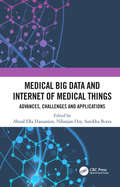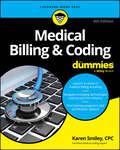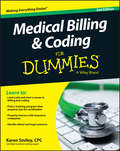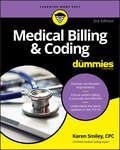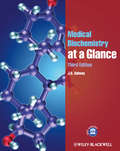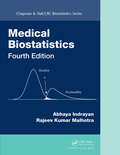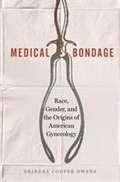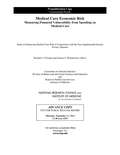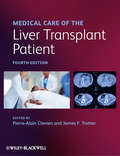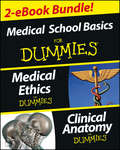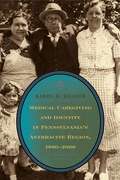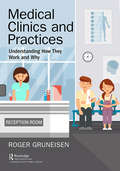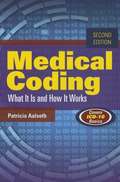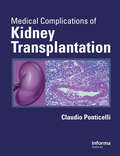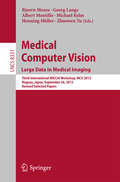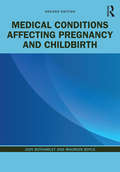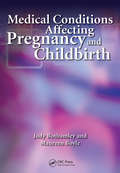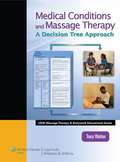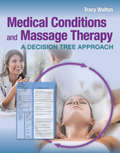- Table View
- List View
Medical Big Data and Internet of Medical Things: Advances, Challenges and Applications
by Aboul Ella Hassanien, Nilanjan Dey and Surekha BorraBig data and the Internet of Things (IoT) play a vital role in prediction systems used in biological and medical applications, particularly for resolving issues related to disease biology at different scales. Modelling and integrating medical big data with the IoT helps in building effective prediction systems for automatic recommendations of diagnosis and treatment. The ability to mine, process, analyse, characterize, classify and cluster a variety and wide volume of medical data is a challenging task. There is a great demand for the design and development of methods dealing with capturing and automatically analysing medical data from imaging systems and IoT sensors. Addressing analytical and legal issues, and research on integration of big data analytics with respect to clinical practice and clinical utility, architectures and clustering techniques for IoT data processing, effective frameworks for removal of misclassified instances, practicality of big data analytics, methodological and technical issues, potential of Hadoop in managing healthcare data is the need of the hour. This book integrates different aspects used in the field of healthcare such as big data, IoT, soft computing, machine learning, augmented reality, organs on chip, personalized drugs, implantable electronics, integration of bio-interfaces, and wearable sensors, devices, practical body area network (BAN) and architectures of web systems. Key Features: Addresses various applications of Medical Big Data and Internet of Medical Things in real time environment Highlights recent innovations, designs, developments and topics of interest in machine learning techniques for classification of medical data Provides background and solutions to existing challenges in Medical Big Data and Internet of Medical Things Provides optimization techniques and programming models to parallelize the computationally intensive tasks in data mining of medical data Discusses interactions, advantages, limitations, challenges and future perspectives of IoT based remote healthcare monitoring systems. Includes data privacy and security analysis of cryptography methods for the Web of Medical Things (WoMT) Presents case studies on the next generation medical chair, electronic nose and pill cam are also presented.
Medical Billing & Coding For Dummies
by Karen SmileyThe essential guide for medical billing professionals, updated for ICD-11 standards Medical Billing & Coding For Dummies will set you up for success in getting started as a medical biller and coder. To ensure data accuracy and efficient data processing, medical offices need professionally trained coders to handle records. This book provides prospective allied health professionals with everything they need to know to get started in medical billing and coding as a career. In addition to an introduction to the basics of medical coding, you'll get information on how to find a training course, meet certification requirements, and deal with government agencies and insurance companies. Learn about the standard practices in the medical billing industry and get up to speed on the ethical and legal issues you're likely to face on the job. This accessible guide is a great entry point—and a great refresher—for anyone interested in the medical billing and coding profession. Get a primer on your career options in the field of medical billing Learn coding practices for telehealth, viral outbreaks, and other emerging issues Update your knowledge of the changes between ICD-10 and ICD-11 coding systems Find training programs and explore your options for certification This Dummies guide is an accessible entry point for prospective professionals looking get a jump on their new career, and current professionals intent on staying up-to-date in this flexible and growing field.
Medical Billing and Coding For Dummies
by Karen SmileyThe easy way to start a career in medical billing and codingWith healthcare providers moving to electronic record systems, data accuracy and efficient data processing is more important than ever. Medical offices need professionally trained billers and coders, either in the office or via telecommute, to handle records for internal and external accessibility and efficiency.Medical Billing & Coding For Dummies gives you everything you need to know to get started in medical billing and coding. It gives you practical, easy-to-follow coverage and advice on how to find a course, educational topics you should review and pursue in order to stay competitive in the field, and the laws and other regulations you'll encounter in your work.Certification requirements and standard industry practicesTips for dealing with government agencies and insurance companiesEthical and legal issuesIf you're looking to start a career in the popular field of medical billing and coding, this hands-on, friendly guide has you covered!
Medical Billing and Coding For Dummies
by Karen SmileyThe definitive guide to starting a successful career in medical billing and coding With the healthcare sector growing at breakneck speed—it’s currently the largest employment sector in the U.S. and expanding fast—medical billing and coding specialists are more essential than ever. These critical experts, also known as medical records and health information technicians, keep systems working smoothly by ensuring patient billing and insurance data are accurately and efficiently administered. This updated edition provides everything you need to begin—and then excel in—your chosen career. From finding the right study course and the latest certification requirements to industry standard practices and insider tips for dealing with government agencies and insurance companies, Medical Billing & Coding For Dummies has you completely covered. Find out about the flexible employment options available and how to qualify Understand the latest updates to the ICD-10 Get familiar with ethical and legal issues Discover ways to stay competitive and get ahead The prognosis is good—get this book today and set yourself up with the perfect prescription for a bright, secure, and financially healthy future!
Medical Biochemistry at a Glance
by J. G. SalwayOffering a concise, illustrated summary of biochemistry and its relevance to clinical medicine, Medical Biochemistry at a Glance is intended for students of medicine and the biomedical sciences such as nutrition, biochemistry, sports science, medical laboratory sciences, physiotherapy, pharmacy, physiology, pharmacology, genetics and veterinary science. It also provides a succinct review and reference for medical practitioners and biomedical scientists who need to quickly refresh their knowledge of medical biochemistry. The book is designed as a revision guide for students preparing for examinations and contains topics that have been identified as 'high-yield' facts for the United States Medical Licensing Examination (USMLE), Step 1. This third edition: Has been thoroughly revised and updated and is now in full colour throughout Is written by the author of the hugely successful Metabolism at a Glance (ISBN 9781405107167) Features updated and improved clinical correlates Expands its coverage with a new section on Molecular Biology Includes a brand new companion website of self-assessment questions and answers at www. ataglanceseries. com/medicalbiochemistry
Medical Biochemistry at a Glance (At a Glance #62)
by J. G. SalwayOffering a concise, illustrated summary of biochemistry and its relevance to clinical medicine, Medical Biochemistry at a Glance is intended for students of medicine and the biomedical sciences such as nutrition, biochemistry, sports science, medical laboratory sciences, physiotherapy, pharmacy, physiology, pharmacology, genetics and veterinary science. It also provides a succinct review and reference for medical practitioners and biomedical scientists who need to quickly refresh their knowledge of medical biochemistry. The book is designed as a revision guide for students preparing for examinations and contains topics that have been identified as 'high-yield' facts for the United States Medical Licensing Examination (USMLE), Step 1. This third edition: Has been thoroughly revised and updated and is now in full colour throughout Is written by the author of the hugely successful Metabolism at a Glance (ISBN 9781405107167) Features updated and improved clinical correlates Expands its coverage with a new section on Molecular Biology Includes a brand new companion website of self-assessment questions and answers at www.ataglanceseries.com/medicalbiochemistry
Medical Biostatistics (Chapman & Hall/CRC Biostatistics Series)
by Abhaya Indrayan Rajeev Kumar MalhotraEncyclopedic in breadth, yet practical and concise, Medical Biostatistics, Fourth Edition focuses on the statistical aspects ofmedicine with a medical perspective, showing the utility of biostatistics as a tool to manage many medical uncertainties. This edition includes more topics in order to fill gaps in the previous edition. Various topics have been enlarged and modified as per the new understanding of the subject.
Medical Biotechnology (ASM Books)
by Bernard Glick Cheryl Patten Terry DelovitchThe future is now—this groundbreaking textbook illustrates how biotechnology has radically changed the way we think about health care Biotechnology is delivering not only new products to diagnose, prevent, and treat human disease but entirely new approaches to a wide range of difficult biomedical challenges. Because of advances in biotechnology, hundreds of new therapeutic agents, diagnostic tests, and vaccines have been developed and are available in the marketplace. In this jargon-free, easy-to-read textbook, the authors demystify the discipline of medical biotechnology and present a roadmap that provides a fundamental understanding of the wide-ranging approaches pursued by scientists to diagnose, prevent, and treat medical conditions. Medical Biotechnology is written to educate premed and medical students, dental students, pharmacists, optometrists, nurses, nutritionists, genetic counselors, hospital administrators, and individuals who are stakeholders in the understanding and advancement of biotechnology and its impact on the practice of modern medicine. Hardcover, 700 pages, full-color illustrations throughout, glossary, index.
Medical Biotechnology, Biopharmaceutics, Forensic Science and Bioinformatics (Multidisciplinary Applications and Advances in Biotechnology)
by Hajiya Mairo InuwaThis book covers a range of topics on exploiting Nigeria’s mega biodiversity for food security and health; DNA forensic science and its applications; medical biotechnology and biopharmaceutics; medicinal and underutilized plants; impact and mitigation of antibiotic resistance; bioinformatics applications; medical insect biotechnology; etc. The book will be useful reference material for the scientists and researchers working in the fields of nutraceuticals, molecular diagnostics and DNA forensics, biopharmaceuticals and medical biotechnology, nanotechnology, antimicrobials from indigenous plant species, bioinformatics, etc. Emphasizes recent advances in biotechnologies that will help in tackling emerging global health challenges Provides detailed information on how to harness indigenous bioresources including microorganisms and plants for healthcare delivery Introduces new frontiers in the areas of molecular diagnostics and DNA forensic science and bioinformatics with case studies, recent advances in medical insect biotechnology and molecular genetics of pest use towards the exploitation of arthropod midgut components to develop interventions against infectious diseases Reviews bioactive molecules derived from commonly used and underutilized medicinal plants that could be used to develop novel drugs for improved healthcare delivery Discusses current approaches in medical and biopharmaceutical biotechnology, deployment of inexpensive genomics-based vector surveillance for effective disease outbreak prediction and control of mosquito-borne viruses Hajiya Mairo Inuwa, Ph.D., is Professor in the Department of Biochemistry and Formerly Director, Centre for Biotechnology Research and Training (CBR&T), Ahmadu Bello University, Zaria, Nigeria. Ifeoma Maureen Ezeonu, Ph.D., is Professor of Medical Microbiology and Molecular Genetics in the Department of Microbiology, University of Nigeria, Nsukka, Nigeria. Charles Oluwaseun Adetunji, Ph.D., is Associate Professor of Microbiology and Biotechnology and Director of Intellectual Property and Technology Transfer, Edo State University, Uzairue, Nigeria. Abubakar Gidado, Ph.D., is Professor of Biochemistry and Director of North-East Zonal Biotechnology Centre of Excellence at the University of Maiduguri. Emmanuel Olufemi Ekundayo, Ph.D., is Associate Professor of Medical Microbiology and Microbial Genetics, Michael Okpara University of Agriculture, Umudike, Nigeria. Abdulrazak B. Ibrahim, Ph.D., is a Capacity Development Expert at the Forum for Agricultural Research in Africa (FARA) and Associate Professor of Biochemistry, Ahmadu Bello University, Zaria, Nigeria. Benjamin Ewa Ubi, Ph.D., is a Professor of Plant Breeding and Biotechnology and Director, Biotechnology Research and Development Centre, Ebonyi State University, Abakaliki, Nigeria.
Medical Bondage: Race, Gender, And The Origins Of American Gynecology
by Deirdre Cooper OwensThe accomplishments of pioneering doctors such as John Peter Mettauer, James Marion Sims, and Nathan Bozeman are well documented. It is also no secret that these nineteenth-century gynecologists performed experimental caesarean sections, ovariotomies, and obstetric fistula repairs primarily on poor and powerless women. Medical Bondage breaks new ground by exploring how and why physicians denied these women their full humanity yet valued them as ?medical superbodies? highly suited for medical experimentation. In Medical Bondage, Cooper Owens examines a wide range of scientific literature and less formal communications in which gynecologists created and disseminated medical fictions about their patients, such as their belief that black enslaved women could withstand pain better than white ?ladies.' Even as they were advancing medicine, these doctors were legitimizing, for decades to come, groundless theories related to whiteness and blackness, men and women, and the inferiority of other races or nationalities. Medical Bondage moves between southern plantations and northern urban centers to reveal how nineteenth-century American ideas about race, health, and status influenced doctor-patient relationships in sites of healing like slave cabins, medical colleges, and hospitals. It also retells the story of black enslaved women and of Irish immigrant women from the perspective of these exploited groups and thus restores for us a picture of their lives.
Medical Care Economic Risk
by Institute of Medicine National Research Council Committee on National Statistics Board on Health Care Services Division of Behavioral and Social Sciences and Education Michael J. O'Grady Panel on Measuring Medical Care Risk in Conjunction with the New Supplemental Income Poverty Measure Gooloo S. WunderlichThe United States has seen major advances in medical care during the past decades, but access to care at an affordable cost is not universal. Many Americans lack health care insurance of any kind, and many others with insurance are nonetheless exposed to financial risk because of high premiums, deductibles, co-pays, limits on insurance payments, and uncovered services. One might expect that the U.S. poverty measure would capture these financial effects and trends in them over time. Yet the current official poverty measure developed in the early 1960s does not take into account significant increases and variations in medical care costs, insurance coverage, out-of-pocket spending, and the financial burden imposed on families and individuals. Although medical costs consume a growing share of family and national income and studies regularly document high rates of medical financial stress and debt, the current poverty measure does not capture the consequences for families' economic security or their income available for other basic needs. In 1995, a panel of the National Research Council (NRC) recommended a new poverty measure, which compares families' disposable income to poverty thresholds based on current spending for food, clothing, shelter, utilities, and a little more. The panel's recommendations stimulated extensive collaborative research involving several government agencies on experimental poverty measures that led to a new research Supplemental Poverty Measure (SPM), which the U.S. Census Bureau first published in November 2011 and will update annually. Analyses of the effects of including and excluding certain factors from the new SPM showed that, were it not for the cost that families incurred for premiums and other medical expenses not covered by health insurance, 10 million fewer people would have been poor according to the SPM. The implementation of the patient Protection and Affordable Care Act (ACA) provides a strong impetus to think rigorously about ways to measure medical care economic burden and risk, which is the basis for Medical Care Economic Risk. As new policies - whether part of the ACA or other policies - are implemented that seek to expand and improve health insurance coverage and to protect against the high costs of medical care relative to income, such measures will be important to assess the effects of policy changes in both the short and long term on the extent of financial burden and risk for the population, which are explained in this report.
Medical Care of the Liver Transplant Patient: Total Pre-, Intra- And Post-operative Management
by Pierre A Clavien James Trotter Beat MüllhauptThis book builds on the success of previous editions, once again providing hepatologists the most current clinical guide on how to best treat the liver transplant recipient. With an international mix of experienced contributors, this new edition highlights initial indication and selection of the potential recipient, management of the donor organ, post-operative complications in the patient through to acute recovery, long-term follow-up, and continued health. This provides the user a complete guide to the correct clinical management of both the recipient and the donor organ through all stages of transplantation.
Medical Career Basics Course For Dummies, 2 eBook Bundle: Medical Ethics For Dummies & Clinical Anatomy For Dummies
by Linda Johnson Larsen Shereen Jegtvig Jane Runzheimer David TerferaTwo complete ebooks for one low price! Created and compiled by the publisher, this medical school basics bundle brings together two of the bestselling For Dummies medical school titles in one, e-only bundle. With this special bundle, you’ll get the complete text of the following titles: Medical Ethics For Dummies Succeeding in the healthcare field means more than just making a diagnosis and writing a prescription. Healthcare professionals are responsible for convincing patients and their family members of the best course of action and treatments to follow, while knowing how to make the right moral and ethical choices. Unlike daunting and expensive texts, Medical Ethics For Dummies offers an accessible and affordable course supplement for anyone studying medical or biomedical ethics and includes moral issues surrounding stem cell research, genetic engineering, euthanasia, and much more. Clinical Anatomy For Dummies Clinical anatomy is the study of human anatomy as it relates to clinical practice. Unlike a basic anatomy and physiology course designed to teach general anatomical knowledge, clinical anatomy focuses on specific structures and issues that people may encounter in a clinical setting. Loaded with clear definitions, concise explanations, and plenty of full-color illustrations, Clinical Anatomy For Dummies presents a friendly, unintimidating overview of the material covered in a typical college-level Clinical Anatomy course. About the Authors of Medical Ethics For Dummies Jane Runzheimer, MD, is a family physician who has served on the Ethics Committee of Methodist Hospital in St. Louis Park, Minnesota. Linda Johnson Larsen has written 24 books, many of which have an emphasis on health, and has been a patient advocate for her husband and several family members. About the Authors of Clinical Anatomy For Dummies David Terfera, PhD, teaches biomedical sciences at the University of Bridgeport College of Naturopathic Medicine. Shereen Jegtvig, DC, MS, is a health and nutrition writer.
Medical Careers and Feminist Agendas: American, Scandinavian and Russian Women Physicians (Social Institutions And Social Change Ser.)
by Elianne RiskaThe increasing proportion of women in the medical profession has been followed keenly both by conservative and feminist observers during the past three decades. Statistics both in Europe and in the United States tend to confirm that women work mainly in niches of the health care system or medical specialties characterized by relatively low earnings or prestige. The segregation of medical work has become increasingly recognized as a sign of inequality between female and male members of the medical profession.Medicine as a social organization is not a universal structure: Health care systems vary in the extent to which physicians work in the private or public sector and in the extent to which they have as a corporate body been able to influence their numbers and the character of their work. The aim of this book is not only to review and to provide an account of women's position in medicine but also to provide an analytical framework. The text revolves around three key issues that illuminate this argument: numbers, medical practice, and feminist agendas of women physicians. The issues are addressed in all the chapters but highlighted as central analytical themes in a cross-cultural context.Challenging previous studies of the medical profession, which have assumed for the most part a gender-neutral stance, Riska's text provides a unique focus. Medical Careers and Feminist Agendas presents a comprehensive, cross-national analysis of the current status of women in three societies where the economics of medical practice vary considerably: a market society, a welfare state, and a formerly communist society in transition. Aimed at a wide audience, this book will be useful for years to come in medical sociology, the sociology of professions, and women's studies. Its historical breadth, current data, and trenchant probing will furnish practitioners and policy-makers alike with a needed analytical tool.
Medical Caregiving and Identity in Pennsylvania's Anthracite Region, 1880–2000
by Karol K. WeaverWhile much has been written about immigrant traditions, music, food culture, folklore, and other aspects of ethnic identity, little attention has been given to the study of medical culture, until now. In Medical Caregiving and Identity in Pennsylvania’s Anthracite Region, 1880–2000, Karol Weaver employs an impressive range of primary sources, including folk songs, patent medicine advertisements, oral history interviews, ghost stories, and jokes, to show how the men and women of the anthracite coal region crafted their gender and ethnic identities via the medical decisions they made. Weaver examines communities’ relationships with both biomedically trained physicians and informally trained medical caregivers, and how these relationships reflected a sense of “Americanness.” She uses interviews and oral histories to help tell the story of neighborhood healers, midwives, Pennsylvania German powwowers, medical self-help, and the eventual transition to modern-day medicine. Weaver is able to show not only how each of these methods of healing was shaped by its patrons and their backgrounds but also how it helped mold the identities of the new Americans who sought it out.
Medical Clinics and Practices: Understanding How They Work and Why
by Roger GruneisenA hospital can be a private or public sector building where patients are admitted for acute treatment. On the other hand, a clinic is a hub of healthcare activity and a place where care providers interact with patients, prescribe medicine, and provide care instructions on what to do after leaving the clinic. Both sites have different and specific operational management needs and requirements. This book serves as a guide to new consultants, management engineers, administrators, and sales professionals seeking to assess simple clinics or medical practice operations. In addition to providing important information about the various aspects of managing a clinic or medical practice, each chapter explains common operating practices seen today and gives some indication of good or better practices. To organize the chapter flow, the chapters are simplified into the typical flow of how a patient moves through the system from patient access to registration to discharge and is presented in a ‘Fact Finder’ format. In this format, the author answers important questions: What is a care team? What kind of physical space does the practice need? What about equipment and technology needs? Finally, the author concludes with key infrastructure concepts, such as leadership and management systems, integration into larger systems, and key measurements. All topics important to those working in or servicing the ambulatory market.
Medical Coding: What It Is and How It Works (Second Edition)
by Patricia T. AalsethIn clear and straightforward language, Medical Coding: What It Is and How It Works, Second Edition provides an overview of the evolution of medical coding and all the various coding systems, how they relate, and how they function. Reasoning and consequences of the delayed ICD-10 implementation are explained along with a sound overview of the ICD-10-CM and PCS classification systems. For those contemplating a career in the coding field, this book is ideal as a basic orientation. Other individuals in healthcare management and administration will also benefit from a basic understanding of how coding works. Unlike other publications that focus only on coding, this book integrates coding guidelines and principles into the billing and reimbursement process, giving the student a more practical foundation in the rationale for correct coding. Healthcare fraud and abuse is addressed as well, to assure that readers understand ethical concerns inherent in coding for reimbursement. Instructor Resources: Instructor's Manual, PowerPoint slides, Test Bank
Medical Complications of Kidney Transplantation
by Claudio PonticelliWith color illustrations throughout, this book analyzes the implications that transplantation and immunosuppression can hold for patients. Discussing the many complications that may occur after kidney transplantation, this source is a must for anyone caring for patients recovering from this type of procedure.
Medical Computer Vision. Large Data in Medical Imaging
by Henning Müller Georg Langs Bjoern Menze Albert Montillo Michael Kelm Zhuowen TuThis book constitutes the thoroughly refereed post-workshop proceedings of the Third International Workshop on Medical Computer Vision, MCV 2013, held in Nagoya, Japan, in September 2013 in conjunction with the 16th International Conference on Medical Image Computing and Computer-Assisted Intervention, MICCAI 2013. The 7 revised full papers and 12 poster papers presented were selected from 25 submissions. They have been organized in topical sections on registration and visualization, segmentation, detection and localization, and features and retrieval. In addition, the volume contains two invited papers describing segmentation task and data set of the VISCERAL benchmark challenge.
Medical Computer Vision. Large Data in Medical Imaging: Third International MICCAI Workshop, MCV 2013, Nagoya, Japan, September 26, 2013, Revised Selected Papers (Lecture Notes in Computer Science #8331)
by Bjoern Menze, Georg Langs, Albert Montillo, Michael Kelm, Henning Müller and Zhuowen TuThis book constitutes the thoroughly refereed post-workshop proceedings of the Third International Workshop on Medical Computer Vision, MCV 2013, held in Nagoya, Japan, in September 2013 in conjunction with the 16th International Conference on Medical Image Computing and Computer-Assisted Intervention, MICCAI 2013. The 7 revised full papers and 12 poster papers presented were selected from 25 submissions. They have been organized in topical sections on registration and visualization, segmentation, detection and localization, and features and retrieval. In addition, the volume contains two invited papers describing segmentation task and data set of the VISCERAL benchmark challenge.
Medical Conditions Affecting Pregnancy and Childbirth
by Maureen Boyle Judy BothamleyMidwives are encountering more and more women whose pregnancies are complicated by medical conditions, including cardiac disease, obesity and diabetes. This new edition is completely up-to-date and offers highly practical solutions for everyday midwifery practice, acknowledging the importance of promoting normality where possible. This text includes physiology, explanations of conditions and principles of care for preconception, pregnancy, labour, birth and the postnatal period. Each chapter brings together the basic knowledge of a condition and how it changes during pregnancy in an integrated and accessible way, including a new chapter dedicated to obesity. Explanations of laboratory tests, diagnostic tests, common drugs and illustrative colour pictures are included in relevant chapters. Medical Conditions Affecting Pregnancy and Childbirth is a vital guide for student midwives, as well as a useful reference for practising midwives.
Medical Conditions Affecting Pregnancy and Childbirth: A Handbook for Midwives (Radcliffe Ser.)
by Maureen Boyle Judy BothamleyMidwives are encountering more and more women whose pregnancies are complicated by medical conditions. The number of women with cardiac disease becoming pregnant is growing each year, obesity, older age and the complex health problems of women born outside the United Kingdom have also been identified as key factors, and women with serious medical c
Medical Conditions And Massage Therapy: A Decision Tree Approach
by Tracy WaltonPresent this quick, effective method for assessing and managing common medical conditions! The central tool of this text is the decision tree, a simple flowchart that helps students quickly determine the optimal massage therapy approach for specific medical conditions. A Decision Tree is included for each of the more than 50 conditions discussed in the book, with massage considerations listed for numerous additional conditions in brief. Also unique to this text are questions therapists can ask clients during the interview process to help the therapist understand not just the medical condition, but how it presents in a particular client.
Medical Conditions In The Athlete
by Micki Cuppett Katie FlanaganMedical Conditions in the Athlete, Third Edition, equips health care providers with the information they need to develop a framework for decision making when working with injured and recovering athletes and active populations.
Medical Conditions and Massage Therapy
by Tracy WaltonWith this book’s streamlined, innovative approach, you’ll learn how to manage and assess medical information in order to determine massage contraindications.
